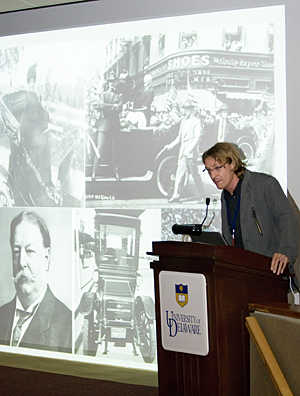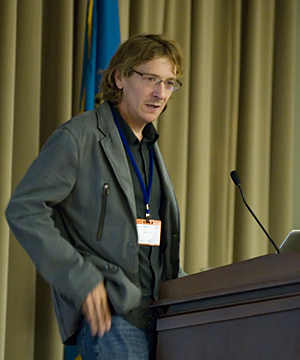- Rozovsky wins prestigious NSF Early Career Award
- UD students meet alumni, experience 'closing bell' at NYSE
- Newark Police seek assistance in identifying suspects in robbery
- Rivlin says bipartisan budget action, stronger budget rules key to reversing debt
- Stink bugs shouldn't pose problem until late summer
- Gao to honor Placido Domingo in Washington performance
- Adopt-A-Highway project keeps Lewes road clean
- WVUD's Radiothon fundraiser runs April 1-10
- W.D. Snodgrass Symposium to honor Pulitzer winner
- New guide helps cancer patients manage symptoms
- UD in the News, March 25, 2011
- For the Record, March 25, 2011
- Public opinion expert discusses world views of U.S. in Global Agenda series
- Congressional delegation, dean laud Center for Community Research and Service program
- Center for Political Communication sets symposium on politics, entertainment
- Students work to raise funds, awareness of domestic violence
- Equestrian team wins regional championship in Western riding
- Markell, Harker stress importance of agriculture to Delaware's economy
- Carol A. Ammon MBA Case Competition winners announced
- Prof presents blood-clotting studies at Gordon Research Conference
- Sexual Assault Awareness Month events, programs announced
- Stay connected with Sea Grant, CEOE e-newsletter
- A message to UD regarding the tragedy in Japan
- More News >>
- March 31-May 14: REP stages Neil Simon's 'The Good Doctor'
- April 2: Newark plans annual 'wine and dine'
- April 5: Expert perspective on U.S. health care
- April 5: Comedian Ace Guillen to visit Scrounge
- April 6, May 4: School of Nursing sponsors research lecture series
- April 6-May 4: Confucius Institute presents Chinese Film Series on Wednesdays
- April 6: IPCC's Pachauri to discuss sustainable development in DENIN Dialogue Series
- April 7: 'WVUDstock' radiothon concert announced
- April 8: English Language Institute presents 'Arts in Translation'
- April 9: Green and Healthy Living Expo planned at The Bob
- April 9: Center for Political Communication to host Onion editor
- April 10: Alumni Easter Egg-stravaganza planned
- April 11: CDS session to focus on visual assistive technologies
- April 12: T.J. Stiles to speak at UDLA annual dinner
- April 15, 16: Annual UD push lawnmower tune-up scheduled
- April 15, 16: Master Players series presents iMusic 4, China Magpie
- April 15, 16: Delaware Symphony, UD chorus to perform Mahler work
- April 18: Former NFL Coach Bill Cowher featured in UD Speaks
- April 21-24: Sesame Street Live brings Elmo and friends to The Bob
- April 30: Save the date for Ag Day 2011 at UD
- April 30: Symposium to consider 'Frontiers at the Chemistry-Biology Interface'
- April 30-May 1: Relay for Life set at Delaware Field House
- May 4: Delaware Membrane Protein Symposium announced
- May 5: Northwestern University's Leon Keer to deliver Kerr lecture
- May 7: Women's volleyball team to host second annual Spring Fling
- Through May 3: SPPA announces speakers for 10th annual lecture series
- Through May 4: Global Agenda sees U.S. through others' eyes; World Bank president to speak
- Through May 4: 'Research on Race, Ethnicity, Culture' topic of series
- Through May 9: Black American Studies announces lecture series
- Through May 11: 'Challenges in Jewish Culture' lecture series announced
- Through May 11: Area Studies research featured in speaker series
- Through June 5: 'Andy Warhol: Behind the Camera' on view in Old College Gallery
- Through July 15: 'Bodyscapes' on view at Mechanical Hall Gallery
- More What's Happening >>
- UD calendar >>
- Middle States evaluation team on campus April 5
- Phipps named HR Liaison of the Quarter
- Senior wins iPad for participating in assessment study
- April 19: Procurement Services schedules information sessions
- UD Bookstore announces spring break hours
- HealthyU Wellness Program encourages employees to 'Step into Spring'
- April 8-29: Faculty roundtable series considers student engagement
- GRE is changing; learn more at April 15 info session
- April 30: UD Evening with Blue Rocks set for employees
- Morris Library to be open 24/7 during final exams
- More Campus FYI >>
11:34 a.m., Aug. 11, 2009----Filmmaker Chris Paine told an audience of more than 150 people at the University of Delaware on Sunday that electric cars are back from the dead, and this time they're here to stay. Writer and director of the 2006 documentary Who Killed the Electric Car?, Paine is now working on a sequel, Revenge of the Electric Car, which will be released in 2011.
His talk at Clayton Hall was part of Energy and Sustainability 2009, which was organized and run by the students in UD's Solar Hydrogen IGERT Program.
EV1, an electric car produced by General Motors during the 1990s and available only through leasing agreements, was unceremoniously killed off when the company recalled and destroyed the entire fleet, claiming that there was no demand for the product.
“That won't happen again,” Paine said. “The public is paying attention this time.”
Paine spooned from an alphabet soup of reasons for the nascent EV renaissance, all the way from “A” for air pollution and asthma to “Z” for Zeitgeist. His recipe included all 26 letters, resulting in a cogent argument for why electric vehicles make sense and a conviction that they will be accepted by an enlightened public in the 21st century.
“D,” of course, was for Detroit. Paine said the auto industry now understands that it needs to get into the electric car business if it's going to resurrect itself. “We saw lots of electric cars at the Detroit Auto Show this year,” he said. In fact, GM is leading the way with the Chevrolet Volt, which can go up to 40 miles on a full charge. As Paine pointed out, most of us live and drive on “25-mile islands,” so this is all we need for daily use.
Despite the stereotypes associated with environmentally friendly vehicles, the electric car of the future is more than just a practical but dull means of transportation. “These cars can be fast, futuristic and fun,” Paine said.
Electric cars have no catalytic converters, mufflers or tailpipes, and many of the maintenance and repair needs associated with gasoline engines are eliminated with electric vehicles. “Many people felt [with EV1] that electric cars threatened the entire service industry,” Paine said. “My answer to that is they also open all kinds of opportunities for retraining in areas like solar power and battery technology.”
Paine praised the University of Delaware for its ongoing research in alternative energy. “There’s some incredible work being done here,” he said.
Paine studied film at New York University and acting at New York's Playhouse Theatre and then went on to graduate from Colgate University in 1983. Throughout the 1980s and 90s, he was both an entrepreneur and a political activist. Since 2000, he has written and produced several documentaries.
Article by Diane Kukich
Photo by Doug Baker




